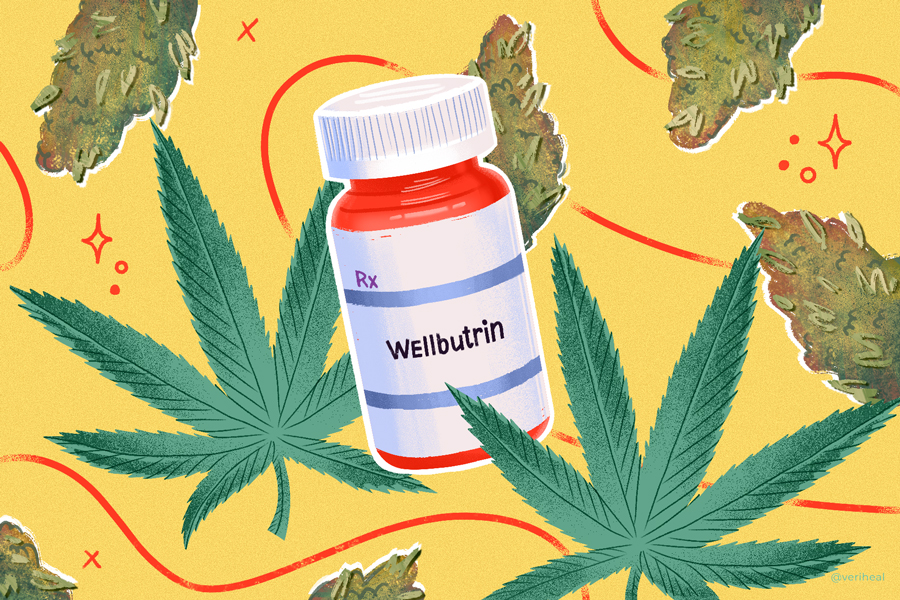Have you ever considered using cannabis to treat your depression? If so, you’re not alone. In fact, a growing number of people are turning to this herbal remedy to help improve their mood. But if you’re taking the antidepressant Wellbutrin (bupropion), is it safe to use cannabis at the same time? Here are some facts you should know before deciding what is right for you.
- What Is Wellbutrin?
- How Does Wellbutrin Work?
- Can Cannabis Help Improve the Effects of Wellbutrin?
- Do Wellbutrin and Cannabis Pose Any Risks When Taken Together?
- Tips for Using Wellbutrin and Cannabis Together
- Final Takeaway
What Is Wellbutrin?
Wellbutrin, a brand of bupropion, is a prescription medication that is used to treat major depressive disorder and seasonal affective disorder. Wellbutrin is also sometimes used as a smoking cessation aid, as it can help to reduce nicotine cravings and withdrawal symptoms. A regular or extended-release tablet is available depending on the individual’s response to the medication.
Some common side effects of Wellbutrin include:
- Dry mouth
- Insomnia
- Headache
- Drowsiness
- Anxiety
- Excitement
- Dizziness
- Nausea
Over time, these side effects usually diminish as the body adjusts to the medication. Generally, Wellbutrin causes few side effects and works well for treating depression.
How Does Wellbutrin Work?
Bupropion works by increasing the levels of norepinephrine and dopamine, types of neurotransmitters, in the brain. In other words, it helps keep those feel-good neurotransmitters circulating for longer, allowing us to make better use of them. As a result, patients who take Wellbutrin may experience a boost in mood and energy levels.
Can Cannabis Help Improve the Effects of Wellbutrin?
According to a study published by Advances in Experimental Medicine and Biology in 2021, scientists found cannabis to be an effective remedy for depression.
When combined with Wellbutrin, cannabis improved the medication’s effectiveness and reduced unpleasant side effects. Also, there is evidence that cannabinoids found in cannabis, such as cannabidiol (CBD), boost neurotransmitter activity and reduce inflammation. Thus, combining CBD-rich cannabis with Wellbutrin may help improve its overall efficacy.
Why You Should Get Your Medical Marijuana Card
Veriheal has satisfied millions of patients nationwide by giving them access to these benefits
- Larger purchase limits
- Peace of mind
- Enhanced legal protection
- Access to higher potency strains
- Save up to 25% on cannabis purchases
- Skip the line at the dispensary
Do Wellbutrin and Cannabis Pose Any Risks When Taken Together?
In light of the increase in acceptance and popularity of cannabis, it’s essential to consider any potential interactions with other medications when using the plant. Although many people report positive outcomes when cannabis is combined with Wellbutrin, research suggests the combination may worsen depression for some people, while anxiety or insomnia may increase for others.
Additionally, researchers have explored whether Wellbutrin could help ease cannabis withdrawal symptoms for people attempting to stop using the plant. While marijuana is not commonly thought of as causing physical withdrawal effects, many people develop a psychological dependence on it and can experience withdrawal symptoms when they try to quit.
Some people report that Wellbutrin has helped ease their withdrawal symptoms. However, for some frequent marijuana connoisseurs, other evidence suggests that the antidepressant may actually worsen moods during marijuana withdrawal.
Tips for Using Wellbutrin and Cannabis Together
Here are a few tips that may help you if you opt to use cannabis and Wellbutrin together:
- Start with a low dose of cannabis. You can always increase the amount if you need to, but it’s best to start slow to avoid any potential unwanted effects.
- Be patient. The effects of Wellbutrin may take a few days to kick in, so don’t give up if you don’t notice an immediate difference.
- Pay attention to your body. If you feel unusually anxious or agitated, consult your doctor.
With a little trial and error, you should be able to find the right combination that works for you.
Final Takeaway
If you’re thinking about combining Wellbutrin and cannabis, the best thing to do is talk to your doctor or pharmacist first. They will be able to educate you on possible risks and drug interactions that could occur. While many people can safely combine these two substances, it’s important to understand that every person is different and that what may work for one person might not work for another, so be ready to make adjustments to your routine as necessary for the best possible outcome.
Note: The content on this page is for informational purposes only and is not intended to be professional medical advice. Do not attempt to self-diagnose or prescribe treatment based on the information provided. Always consult a physician before making any decision on the treatment of a medical condition.
Author, Share & Comments
















